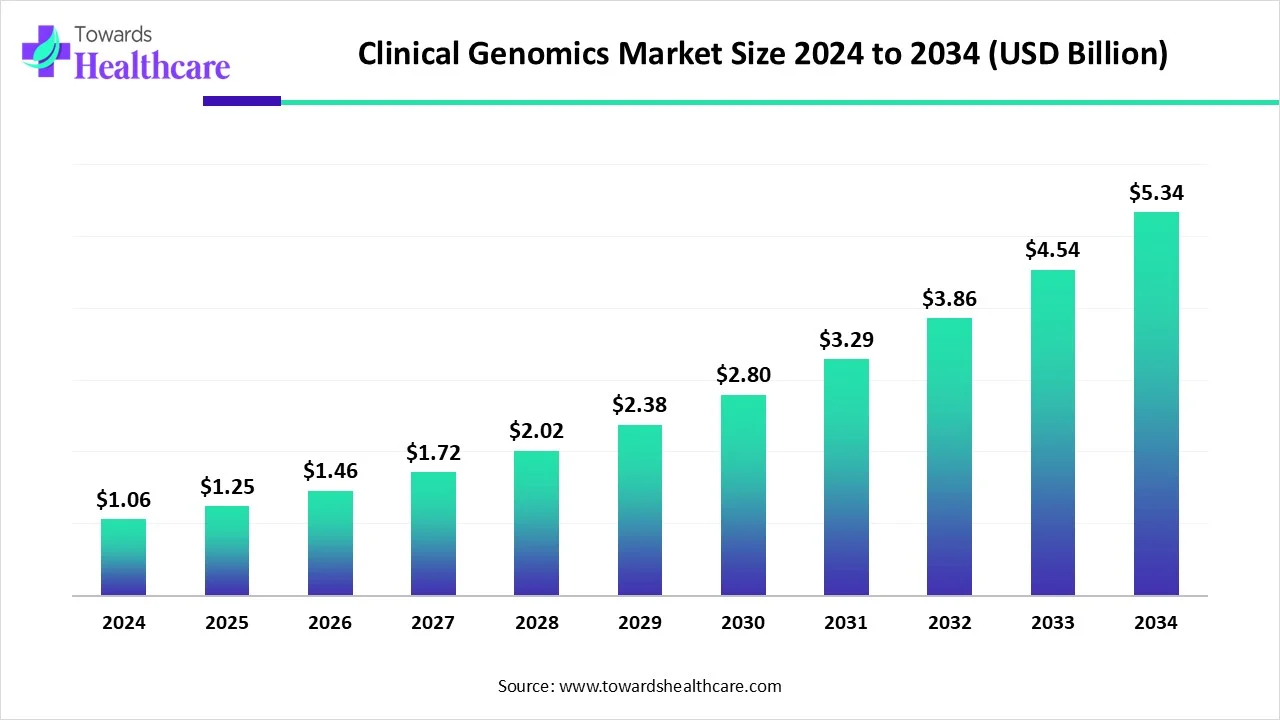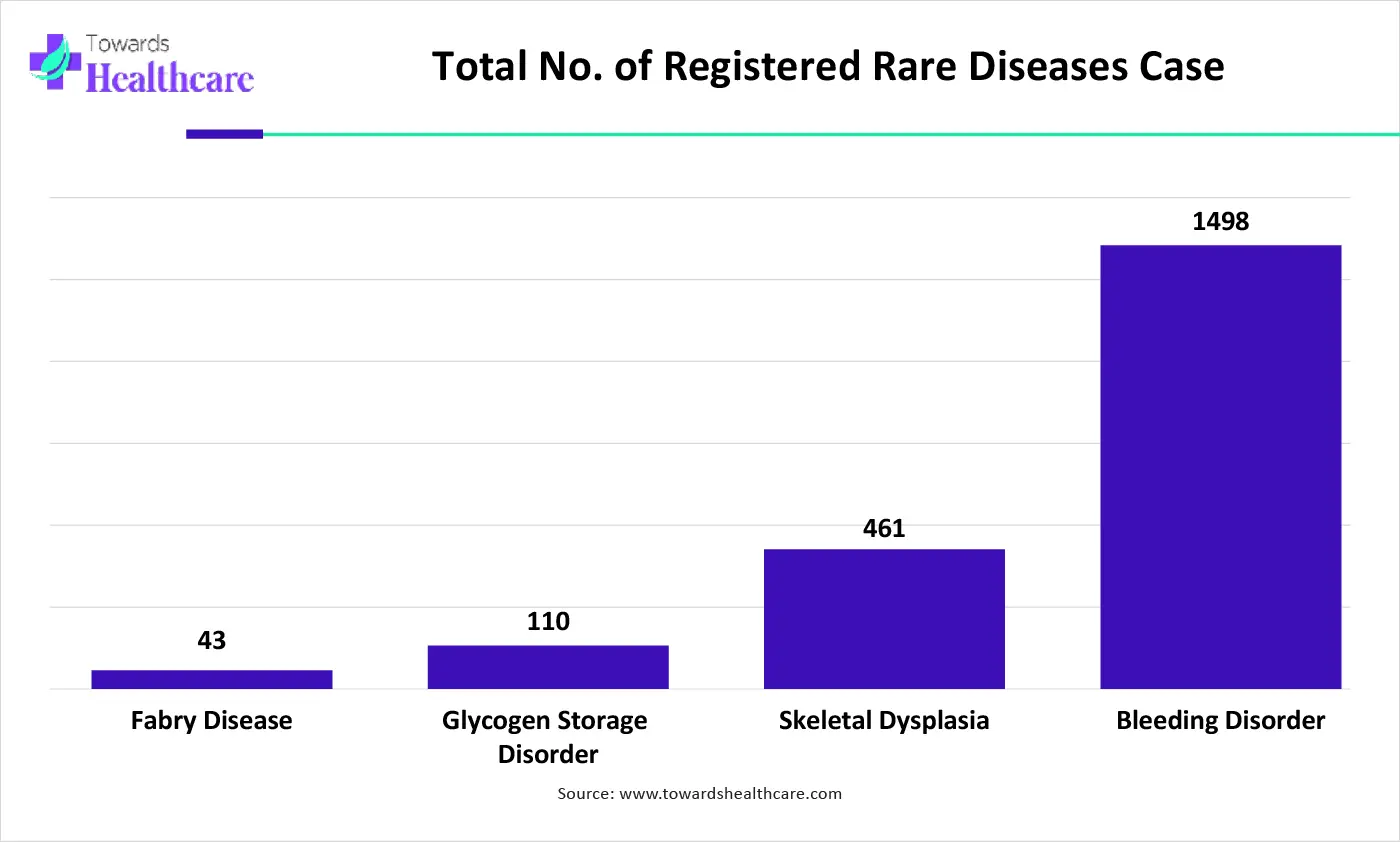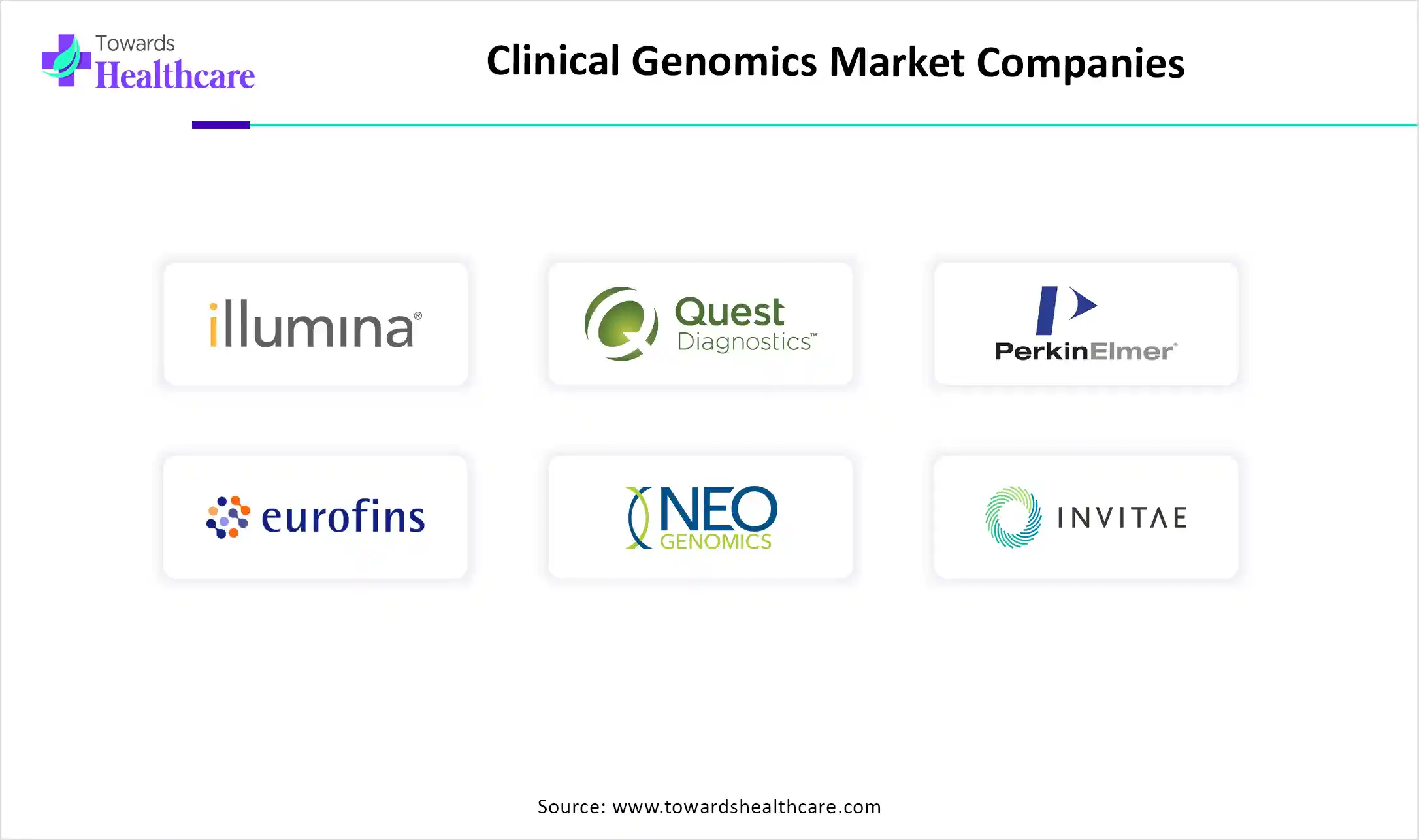February 2026

The global clinical genomics market size is calculated at US$ 1.06 in 2024, grew to US$ 1.25 billion in 2025, and is projected to reach around US$ 5.34 billion by 2034. The market is expanding at a CAGR of 17.54% between 2025 and 2034.
The growing use of clinical genomics in next-generation sequencing, diagnosis, molecular testing, as well as in the development of personalized and precision medicine, is growing. At the same time, new AI-integrated platforms are also being developed and launched by various companies. This, in turn, is increasing the strategic collaboration between the companies. Additionally, their demand in various regions is also increasing due to advancing healthcare, research and development, increasing investments, growing demands, etc. Thus, all these developments are promoting the clinical genomics market growth.

| Metric | Details |
| Market Size in 2025 | USD 1.25 Billion |
| Projected Market Size in 2034 | USD 5.34 Billion |
| CAGR (2025 - 2034) | 17.54% |
| Leading Region | North America |
| Market Segmentation | By Test Type, By Method, By End User, By Region |
| Top Key Players | Illumina, Inc., Quest Diagnostics Incorporated, PerkinElmer, Inc., Eurofins Scientific SE, Rosetta Genomics Ltd., NeoGenomics Inc., Invitae Corporation, Foundation Medicine, Inc., Genomic Health, Inc., Natera, Inc., Myriad Genetics, Inc., Clinical Genomics Pty Ltd., OPKO Health, Inc., 23andMe, Inc., Centogene AG, Gene by Gene, Ltd., Iverson Genetic Diagnostics, Inc., GenomeDx Biosciences, Inc., PathGroup, Veritas Genetics, Personalis, Inc., MedGenome, Strand Life Sciences Pvt. Ltd., Retrogen, Inc., Beijing Genomics Institute (BGI) |
In clinical genomics, the use of next-generation sequencing (NGS) approaches is continuously growing. With these sequencing approaches, the data about the genomic, epigenomic, and transcriptomic evaluations can be collected through a combination of whole-genome sequencing, mRNA, exome, and bisulfite sequencing. Furthermore, clinical genomics can be used in diagnosis, screening, and the development of new treatment approaches. Thus, their use in diseases such as cancer, neurobiology, or chronic illness is increasing. At the same time, their use in the field of precision medicine is also anticipated to rise.
The use of AI in clinical genomics is rising for the development of personalized medications. At the same time, new platforms for analysis of genomics and potential therapeutics are also being developed. Furthermore, its use to enhance the phenotype prediction for identifying the phenotypic diseases, drug discovery, as well as precision medicine, is also increasing. To improve the patient's quality of life and reduce medical expenses, the use of AI in the interpretation of complex genetic data and all research information is also increasing.
Rising Prevalence of Genetic and Rare Diseases
The growing occurrences of genetic and rare diseases are increasing the demand for clinical genomics. Clinical genomics helps in the early detection of these diseases. Furthermore, they are more accurate and quicker than the traditional diagnostic methods. At the same time, clinical genomics also helps in the selection of proper treatment approaches, personalized medicine, or precision medicine. This, in turn, is increasing their use in newborn testing, due to their non-invasive techniques. Thus, this in turn drives clinical genomics market growth.

The graph represents the total number of registered cases of rare diseases. It indicates that there is a rise in cases of rare diseases. Hence, it increases the demand for clinical genomics for enhancing new diagnostic and treatment options for their effective management. Thus, this in turn will ultimately promote the market growth.
High Price
Clinical genomics requires advanced technologies, infrastructure, as well as equipment. At the same time, the data generated is complex to interpret. This, in turn, increases the demand for expertise. Furthermore, regulatory barriers also contribute to the enhanced cost. Thus, this makes clinical genomics expensive, resulting in limited patient access.
Advancements in Molecular Diagnostic Testing
The use of molecular diagnostic testing is growing in the effective management of various diseases. This, in turn, increases new developments to enhance its parameters. These tests are being used in DNA sequencing, PCR techniques, CRISPR-based diagnosis, as well as in microfluidics. At the same time, their use in personalized medication plans is also increasing. Additionally, the use of liquid biopsy is also increasing due to its non-invasive procedure. Moreover, new developments are also being considered with the integration of AI. Thus, this promotes the clinical genomics market growth.
For instance,
By test type, the diagnostic testing segment held the largest share of the market in 2024. The diagnostic testing was used in the diagnosis of various genetic, as well as other diseases, as it provided accurate results. This contributed to the market growth.
By test type, the genetic testing segment is expected to show the fastest growth rate at a notable CAGR during the predicted time. The growing genetic disorders, as well as growing awareness, are increasing the use of genetic testing.
By method type, the biochemical tests segment held the dominating share of the market in 2024. The increased use of biochemical tests contributed to the diagnosis and screening of newborns, as well as for metabolic disorders. This further enhanced the market growth.
By method type, the molecular tests segment is expected to show the fastest growth rate during the upcoming years. The molecular tests are being preferred choice for the detection of infectious diseases, as well as cancer. New advancements are also driving their use.
By end user, the hospitals & clinics segment led the global market in 2024. A large volume of patients were tested with the help of genomic tests for a variety of diseases in hospitals & clinics in the presence of skilled professionals, which in turn, promoted the market growth.
By end user, the academic and research institutes segment is expected to show the highest growth during the predicted time. Increasing interest is driving several new developments in the field of clinical genomics in academic and research institutes. These are further supported by the funding provided by the government as well as the private sector.
North America dominated the clinical genomics market in 2024. North America consisted of a well-established healthcare sector along with the presence of skilled personnel and advanced technologies, which enhanced the use of clinical genomics. This contributed to the market growth.
The industries in the U.S. are utilizing advanced technologies to improve the applications of clinical genomics. Moreover, with the help of AI, new genetic testing platforms are also being developed. This, in turn, is enhancing the collaboration between the companies.
The growing awareness about genetic diseases in Canada is increasing the interest in the research sectors. At the same time, the use of clinical genomics in the development of precision medicine is also growing.
Asia Pacific is expected to host the fastest-growing clinical genomics market during the forecast period. The healthcare sector in Asia Pacific is expanding due to growing utilization of advanced technologies, research and development, investments, etc. This enhances the market growth.
The use of clinical genomics in early diagnosis and screening of various diseases and infections is growing in China. Furthermore, the industries are also leveraging advanced technologies for enhancing their production as well as improving the interpretation of the data acquired.
The growing diseases, along with the rising awareness of the use of genetic testing, are increasing in India. This, in turn, increases the research and development, which are further supported by the funding or investment provided by the government.
Europe is expected to grow significantly in the clinical genomics market during the forecast period. Due to accurate and fast results along with rising non-invasive testing’s, the demand for the use of clinical genomics in Europe is growing. This promotes the market growth.
The use of genetic testing in the healthcare setting is increasing due to its various advantages in Germany. At the same time, their compliance with the rules and regulations laid by the regulatory bodies is also contributing to their enhanced use.
The demand for personalized or precision medicine in the UK is increasing due to the rising use of clinical genomics in the field of rare diseases or oncology. At the same time, new collaborations are also formed to develop innovative techniques and medications.

By Test Type
By Method
By End User
By Region
February 2026
February 2026
January 2026
December 2025